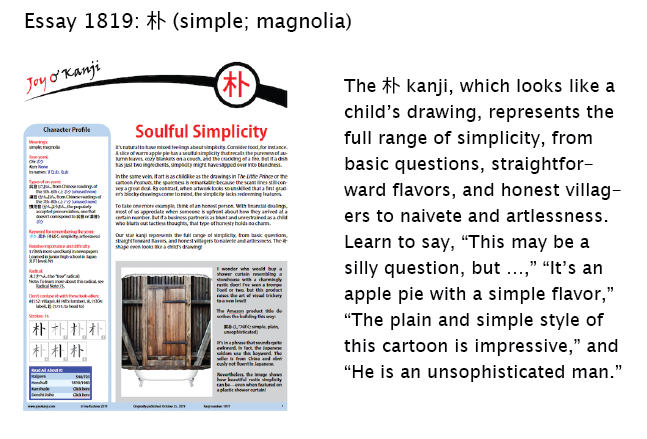Through a Child's Eye
Life feels inordinately complicated right now, as we here in Northern California face another planned power outage, this one potentially compounded by unbreathable air from an inferno in the Wine Country north of San Francisco. Our two wretched choices are having our houses burn down versus enduring days on end with no electricity.
Strangely, while all this complexity weighs on me, I keep noticing refreshing bits of simplicity, all tied in with kanji.
For one thing, a BBC article this week featured a Chinese artist who perceives odd Chinese terms for animals with a childlike innocence and then turns those funny concoctions into playful pictures. As I scrolled through the piece, I loved her fresh take on words and her clever drawings, but most of all I enjoyed thinking about how certain words compare in Chinese and Japanese. Here's a bit of what I found:
| Animal Term | Simplified Chinese | Traditional Chinese | Japanese |
| zebra | 斑马 ("patterned horse") | 斑馬 | 縞馬 (しまうま: "striped horse") where 縞 is non-Joyo |
| dolphin | 海豚 ("sea pig") | same | same |
| gecko | 壁虎 ("wall tiger) | same | 守宮 (やもり or しゅきゅう: "palace protector") |
Read to the end of the BBC piece to find out what "rice bunny" represents in Mandarin!
Another recent article also embraces the notion of innocence. I'm referring to a Japan Times piece by Facebook friend Damian Flanagan. Among other things, he argues that "the more you immerse yourself in a language, the less vivid, intense and 'alive' are your reactions to the culture from which that language sprang." The outsider brings a wide-eyed perspective that's unavailable to the native speaker or even the fluent nonnative speaker.
I've long wondered about that in terms of my passion for kanji. Early on, it distressed me to think that the more knowledge I acquired, the less wonderment I'd feel. Indeed, whereas 言葉 (ことば: word) once amazed me—a "word leaf"?!—I no longer "see" 言葉 that way at all. When I encounter that term in a sentence or title, I perceive it only as a unit with a useful meaning, and my eye quickly drifts elsewhere.
But Japanese happens to contain 30 zillion words, give or take a trillion, so my wonderment just shifts to the next astounding compound and then the next and the next. I don't anticipate a shortage of material to make me marvel or outright laugh. When it comes to Japanese, I'm the permanent outsider and therefore the eternal innocent child.
It just so happens that my newest essay has a great deal to do with childlike simplicity and naivete. Here's what I said about 朴 (simple; magnolia) in the sneak preview:
Childlike curiosity comes through, for instance, in a sentence featuring 素朴 (そぼく: simple; artless; naive):
素朴な疑問だけど、・・・トラとライオンはどっちが強いの?
This may be a silly question, but which is stronger, a tiger or a lion?
疑問* (ぎもん: question); トラ (虎: tiger); 強い (つよい: strong)
(That's the second tiger reference so far in this blog. Does that mean something?)
This sentence from the essay places a high value on simplicity:
この漫画の単純素朴な作風が印象的だ。
The plain and simple style of this cartoon is impressive.
漫画 (まんが: cartoon); 単純 (たんじゅん: simple); 作風 (さくふう: style); 印象的 (いんしょうてき: impressive)
Indeed, when art is as childlike as the drawings in The Little Prince or the cartoon Peanuts, the spareness is remarkable because the scant lines still convey a great deal.
The 朴 kanji introduced me to several sentences and book titles involving simple food, including a grandmother's down-home cooking, an apple pie with a pleasingly simple flavor, and confections that are simple to prepare.
We find a different kind of culinary simplicity with this book title:
「素朴な疑問 食品の裏側から くらしの中の添加物・調味料入門」
Simple Questions: (Answered) From the Side of Food You Don't Usually See—An Introduction to Additives and Seasonings (Used) in Life
食品 (しょくひん: food); 裏側 (うらがわ: other side); くらし (暮らし: life); 中 (なか: in); 添加物 (てんかぶつ: additive); 調味料 (ちょうみりょう: seasoning); 入門 (にゅうもん: introduction)
The rebellious child in me rejoiced on seeing 裏側 (うらがわ: other side) and learning that it literally means "the wrong side"—namely, “things that people don’t usually see or know." The author hopes to teach people to read food labels so as to avoid additives. Labels and additives bore me, but I'd love an introduction to the wrong side of just about any other topic!
Catch you back here next time!
❖❖❖
Did you like this post? Express your love by supporting Joy o' Kanji on Patreon:



Comments